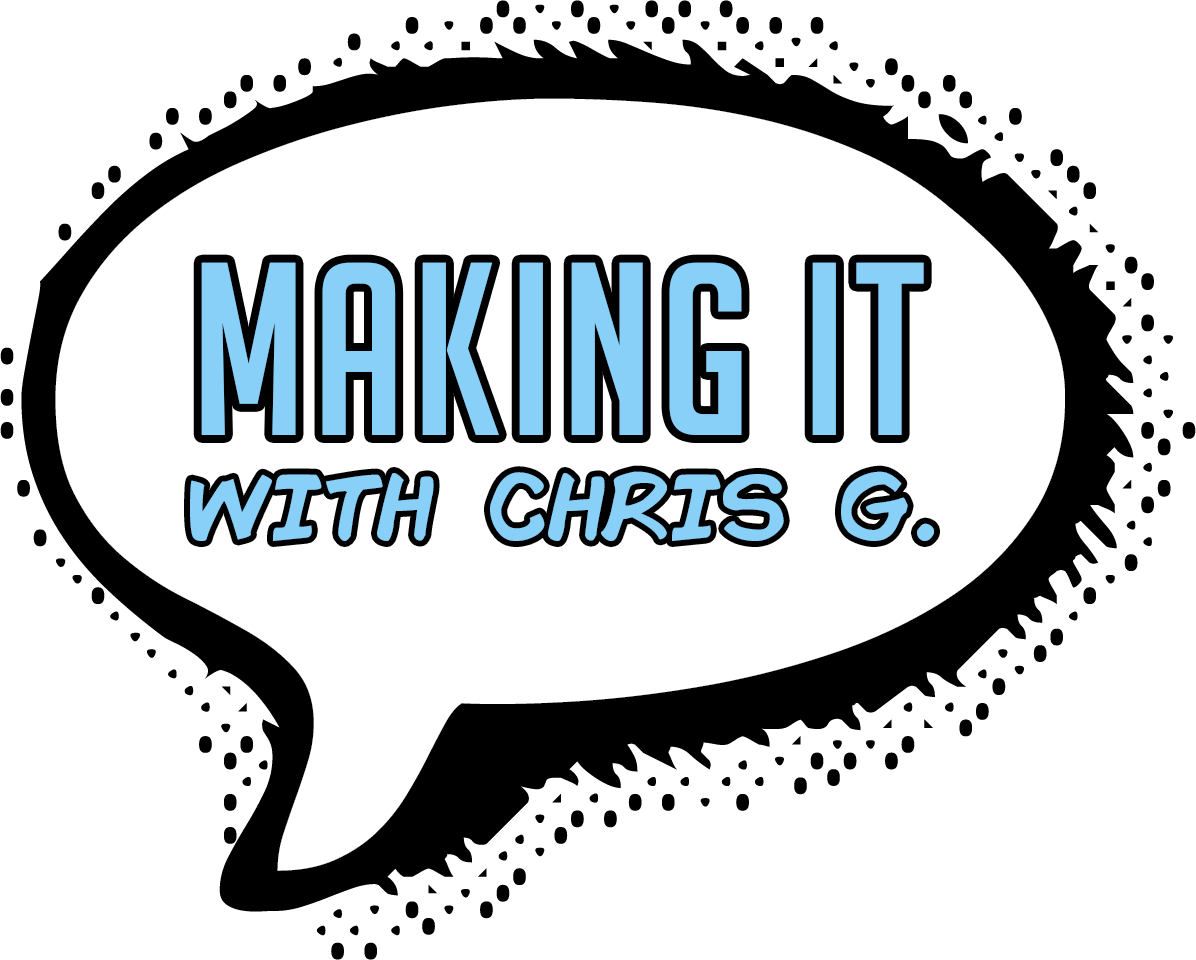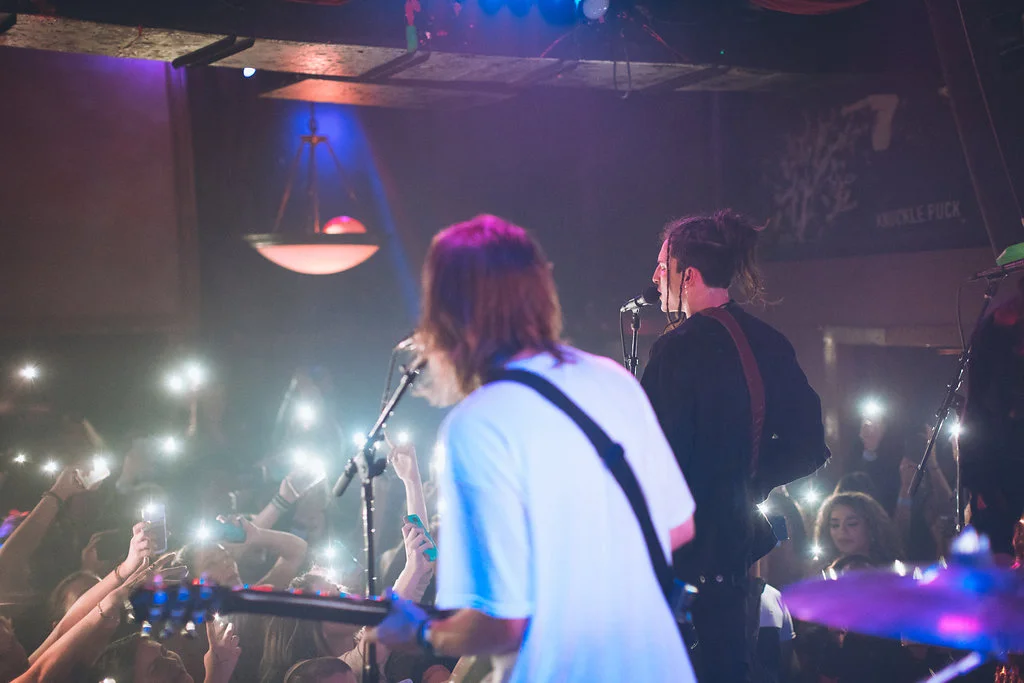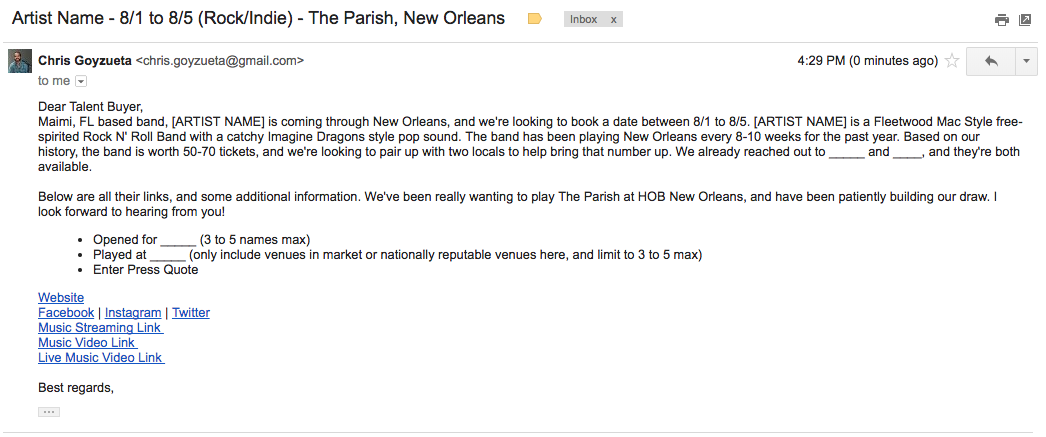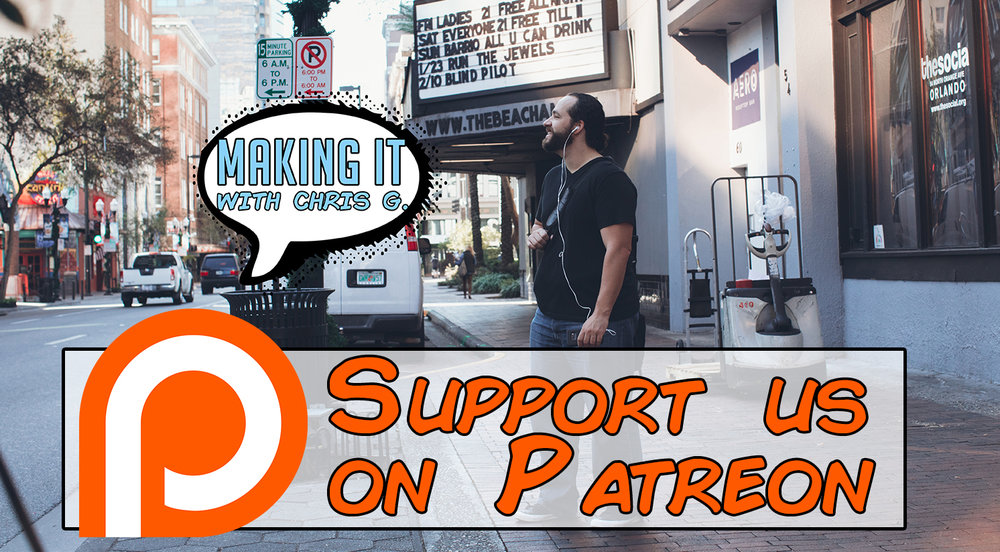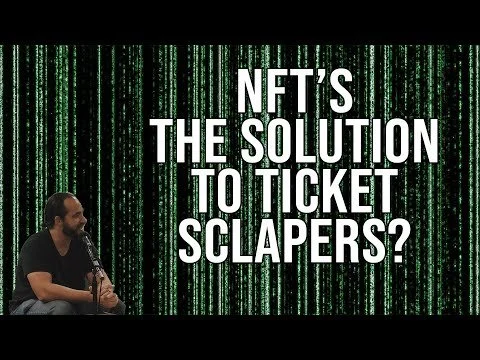Booking More Shows by Writing Better Emails to Talent Buyers, Promoters, and Venue Owners
/If you’ve tried booking shows for your band, you’re probably familiar with sending tons of emails and getting excited about the very few responses. What’s even more exciting is being able to book a show with a complete stranger at a venue you’ve never worked with before, and in a city, you’ve never played before. Those usually get a little fist pump in the air. These are probably the emails you look back at and try to figure out what you did right, and start using that as your new or modified template of what you send to venues, promoters, and talent buyers going forward. Just to start the process all over again with sending out several emails that get ignored. Booking your band can seem like a game of numbers and a total soul crusher. The more emails you send out, the more responses you get. This takes a lot of time, along with trying to track down contacts for the venues bookers or talent buyers, or trying to track down promoters that book shows at those venues. This whole process would be much easier, and less time consuming if musicians just send an email to promoters, talent buyers, and venues of what they’re actually looking for. One of the biggest things they want to see is that you can bring people to their venue, and it really helps if those people are drinkers. We all want to sold-out shows of people that spend $20 plus per person at the bar, but that’s not possible every day.
In my short 10 year history as a Talent Buyer and Promoter, I’ve booked over 2,000 shows. I definitely have my pet peeves and specific things I look for in emails. However, these are habits and preferences I personally developed over time, and as I mentioned, I still consider myself fairly early in my career having started in 2006. To get a better understanding of what venues are looking for, I reached out to over 50 Talent Buyers, Promoters, and Venue Owners, and got some amazing feedback from all over the United States of what types of emails get the most responses, which get ignored, pet peeves, what to include, and much more. Hopefully, this article will lead to better emails for my fellow Talent Buyers and Promoters, and more confirmed shows for all my musicians out there. Here are some of the most common responses and key takeaways to help you craft a better email the next time you try to book a show. Also, see sample email at the end.
1. Keep it Quick and Short
The fastest way to end up in someone’s “trash” is by sending long emails. In the book, “How to Make It in the New Music Business,” Ari Herstand, has an eight-sentence rule. This experience comes from having booked hundreds of shows for himself. The eight-sentence rule is a really good place to start. However, you can also include bullet points, which keeps the emails clean and easy to read. This is something ICM booking agent, Meg White, mentioned in our podcast episode. Tim Hall from JaxLive and Mavericks in Jacksonville, FL, likes to see one to two paragraphs at max. Anything more is too much. Remember that Talent Buyers, Promoters, and Venue Owners are getting a ton of inquiries every day. If your emails are too long, you’re not going to get a response. Your MAX should be 10 sentences, grouped into two paragraphs. Anything more than that, you’re going to reduce your chances of a response drastically.
2. Be Professional
Always err on the side of professionalism. If you have never met them in person and have developed a friendship or a good acquaintance, keep it, professionals. Avoid starting your emails with; Hey!, hey man, hey bro, what’s up, etc. The best way to start an email is to use the person’s first name, followed by a comma, and then start a new line to start your message. Or you can add “Dear” in front of their first name. Stay professional throughout the email, don’t make any crazy demands, and don’t request for them to call you, or ask for them to respond ASAP. These are all things that’ll most likely send your emails straight to the trash or get ignored. One of the Talent Buyers mentioned one of their pet peeves is getting notes in the emails that say “We want to play your room - please respond.”
3. Personalize Your Message
I was shocked to see how many people mentioned that most artists send out email blasts, and never address the Talent Buyer, Promoter, or Venue Owner at all. Whenever I get those emails, I delete them right away. My thought is, “they weren’t asking for or addressing me, so this email is not for me. Delete!” This is a relationship business. If you listen to the podcast, you’ll hear every guest stress the importance of relationships, and adding value to those relationships. Take the time to research who to address the emails to. Also, it never hurts to do some research on their social media pages, or LinkedIn profile to get know about some of their interests. However, if you go personal, make sure it comes across as truly genuine, and not like you’re trying to follow the steps of “How to Win Friends and Influence People”. They’ll see right through that.
If you can’t find a contact, call the venue, and say something along the lines of this:
“My name is Chris. Sorry to bother you with a call, but I could not find a contact on your website or Facebook page. I’m interested in booking a show at your venue. Could you direct me to an email address for the person that’s responsible for booking your venue?” Followed by “Thanks so much for your time. You’ll be receiving an email from _____ (enter your band name) shortly. Have a great day!”
4. Be Honest About Your History in the Market
As I mentioned before, the music business is all about relationships. If you’re being dishonest at any point, you’re going to burn bridges, and not book any shows. One of the questions you’ll get from most Talent Buyer, Promoter, or Venue Owners, is about your history in the market, or your history in that city. Where have you played before, when, how many tickets did you sell, who else did you play with, or is this your first time in the market? If you tell a venue you can sell 200 tickets, and come up drastically short, you’re probably never going to work with that venue again. Be honest about your numbers. This is one of the biggest things that was stressed. It’s mind-boggling how many artists lie about their numbers. Most of the times we can read through the BS, but some will slip through the cracks and burn a bridge. Be honest!
Also, if you opened for a known national act before, regardless of which city, make sure to include that. Even though it may not mean you’re worth tickets in the city you’re trying to book, It’s like a stamp of approval. Jeffrey Liles, the Artistic Director at The Kessler Theater in Dallas, TX said, “If the headliner believes in another artist enough to put them on as an opener, then that new act comes with a sort of unspoken approval of that headliner, and subsequently, access to their own fan base. The best advice I could give to a younger artist is to have a more established artist pitch their material on their behalf. Makes all the difference in the world.”
It’s ok if it’s your first time in the market, and you aren’t represented by a national booking agent. But start at a smaller venue with a capacity of under 200 people. I always like the philosophy of underplaying, and purposely playing a smaller venue that you can pack out. If you’re confident you can get 50 people out, play a coffeehouse that holds 20 to 30. Also, another great way to get your first show in a new city is by playing house concerts. Check out the podcast episode I did with Shannon Curtis, and where she talks about how she’s making over $60,000 per year playing house concerts. House concerts are not just for singer just for singer-songwriters anymore. I’ve seen an endless amount of metal bands doing garage shows, and Rappers/DJ’s hosting house parties.
Another thing that helps, is finding a few local bands to play with, and trade shows with them. A lot of times booking an unknown band can be really tough, and a lot of work. If you come to the Talent Buyer, Promoter, or Venue Owner with a complete line-up of 2 to 3 local bands, you’re going to increase your chances of getting a response, and getting booked. Especially if these are locals they’re familiar with.
5. Your Social Media Following Matters (Somewhat)
Your social media numbers matter, but are not the end all be all. If you have a few hundred followers, you might want to stick to building your hometown first. There is no set formula, but here are some numbers you can go by. If you’re an out of town band but from the same state, I’m more confident in booking you with 2,500 to 5,000 followers. If you’re from out of state, but within the region, I like to see 10,000+ followers. And if you’re from another side of the country, I gain confidence with 20,000+ followers. However, these are not set in stone numbers. Everyone has different parameters and it varies by genre, but make sure that your stats are not in the hundreds or under 2,000. You have some work to do before playing outside of your hometown.
6. Which Links to Include
I’m surprised from all of the responses of how many people mentioned that musicians forget to include links to their website and social media pages. Include all of your links, and lead with the strongest platforms first (where you have the most followers). The links you should include are your website, Facebook, Instagram, Twitter, a link to a video (preferably one professional music video, and one live video), and a link to where someone can stream music (Spotify, SoundCloud, or Bandcamp are best). Dana Sims, Talent Buyer at El Corazon / Funhouse in Seattle, WA, said that 70% of artists forget to include a link to their website, socials, and music.
Make sure that your links are NOT mobile links (example m.facebook.com/yourband). Take out the “m.” Mobile Facebook links won’t open properly on a laptop. Try to use hyperlinks, smart url’s or bit.ly links to make everything look clean and reduce the amount of text in your emails. Laurie Koster at The Evening Muse in Charlotte, NC said “Send links to your website, socials, music, and video(s). Be sure they’re all working.”
7. Be Specific with the Dates You're Looking For
Be very specific about the dates you’re looking for. If you don’t send specific dates, you’ll probably get ignored. Keep dates to a 3 to 5 day range, and 10 at max. Make sure to check the venue's website first, and that the dates you’re looking for are not already booked. Always do your homework first on what dates seem to be open on their calendar, and the type of music they book. Also, don’t assume, just because the date doesn’t have a show confirmed on the website that the date is available. The date could still be booked, but it’s a show that’s not announced yet or a hold that’s about to confirm. Just cause it’s not on the website, doesn’t mean the date is available, but definitely, don’t send an email for a date that’s already confirmed on the website. I like including the dates in the email and the subject. Also, to make your emails look shorter, list your dates as “MM/DD” (example, 11/27 instead of “November 27th” or “Nov 27).” Using the “MM/DD” format decreases the number of characters you use, and it’s easier to read.
8. Include Data Relevant to the Market
Data can really help when you don’t have a history in the market. If you’re getting a lot of plays on Spotify, sales, or followers in a specific area, you can use that to help give the Talent Buyer, Promoter, or Venue Owner more confidence in booking you or your band. Including backup is always a good idea. Remember, building an honest relationship is the key. It doesn’t hurt to be transparent. If you can find a good and the right partner to promote you in a new city, you can build a relationship that’ll last you your entire career.
9. Don't Forget to Mention Your Genre
Make sure to list your genre. You can combine this with your elevator pitch. More on that shortly.
10. What Type of Content You Should Have?
Make sure you always put your best foot forward. You should have nice easy to navigate website, professional press photos and live photos, and a few high-quality live videos or acoustic videos, and most preferably one professional music video. Also, make sure that your music is always the best quality possible. Don’t send demos. Take your band serious, if you want others to take you seriously. It’s easy to build a website these days on platforms like Bandzoogle or Squarespace. You don’t have to hire a fancy web designer to get a professional website done. If you can attach a photo to an email, you can build a website.
11. Use an Elevator Pitch Instead of Your Bio
Don’t include bios in your email. Keep those on your website. Most Talent Buyers, Promoters, and Venue Owners will never read them. David Magazine at House of Blues / Live Nation New Orleans said, “Describe the band/act in one sentence/blurb – what is this you are booking? Common mistakes…that’s tough but I’d say that long bios are unnecessary – in fact I’d skip the bio in favor of press quotes and relevant market history”
Come up with a short one-sentence elevator pitch that describes your genre, and makes some potential comparisons of similar artists your music may sound like. These comparisons are not saying that you sound exactly like a specific band, it’s just to give them an idea, and to get their attention. Just make sure to be humble. When you say you sound like Adele, the expectations are going to be extremely high. Don’t fall short. If you say something along the lines of “you don’t sound like anyone else or completely unique and different” you’re probably not going to get a response.
12. Include Press Quotes if You Have Them
If you have any write-ups on notable blogs or in the paper, including a quick quote from what someone said about your band can be helpful to include. These are not something that’s a must to be booked but can help if it’s a blog that most people will recognize. That will show that your band is getting the attention of the press, which will hopefully lead to selling tickets down the road.
13. Do NOT Message on Facebook
One of the biggest pet peeves that most responded with are messages on Facebook. Don’t track down and send friend requests to Talent Buyers, Promoters, and Venue Owners on Facebook. For most this was a “deal breaker.” It would be for me too. If and ONLY if, you have done your homework and can’t track down a contact. A message along the lines of:
14. Don't Get Lazy With Your Subject Lines
Don’t get lazy with your subject lines. I like including the artist name, dates, and genre in parentheses in the subject line followed by the venue you’re reaching out to. So they know it’s specific for their venue, and it’s not an email blast.
Example: Band Name, 8/1 to 8/5 (Rock/Indie) - Venue Name
15. Be Patient and Make Sure to Follow-up
These go together, because some musicians never make the effort to follow-up, and some are very impatient and will send a message every day or every other day. That’s too much. Make sure to always follow-up. Getting no response isn’t always a rejection. It could just mean that they have a lot going on that week. Also, send new emails. Don’t reply to your previous email, or send anything along the lines of “2nd request,” “3rd request,” etc. This will put you on their ignore list. Always follow-up, but give it at least 7 days in between follow-up messages.
Big thank you to all of the following promoter, talent buyers, and venue owners for your feedback! Plus all of the anonymous ones. We really appreciate your support!!
Bruce Krippner, Talent Buyer at Martyrs’ - Chicago, IL
Charles Bilsker, Hometeam New Years Rally Festival - Tampa, FL
Dan Steiny, Co-Founder of Emporium Presents and Promoter 101 Podcast - Auburn, WA
Dana Sims, Talent Buyer at El Corazon / Funhouse - Seattle, WA
David Magazine, Talent Buyer at House of Blues / Live Nation New Orleans
Jeff Liles, Artistic Director at Kessler Theater - Dallas, TX
Justin Willis, Talent Buyer at Nowhere Bar - Athens, GA
Kate Dale, Director of Entertainment at River Music Experience - Davenport, IA
Laurie Koster, Co-Owner of The Evening Muse - Charlotte, NC
Libby Brickson, Talent Buyer at City Winery - Chicago, IL
Ron Brice, Talent Buyer at 3rd & Lindsley - Nashville, TN
Tim Hall, Owner of Jax Live - Jacksonville, FL
Sample Pitch Email
RELATED ARTICLES
1. Inside the Life of a Talent Buyer
2. How to Open for National Acts
3. Interview with Kevin Stone, Talent Buyer at Florida Theater in Jacksonville, FL
4. Interview with Dan Larson, Okeechobee Festival
5. Interview with Allen Anders, AEG Presents
6. Interview with Michael Yerke, Live Nation
7. Interview with Ben Weeden, Live Nation
